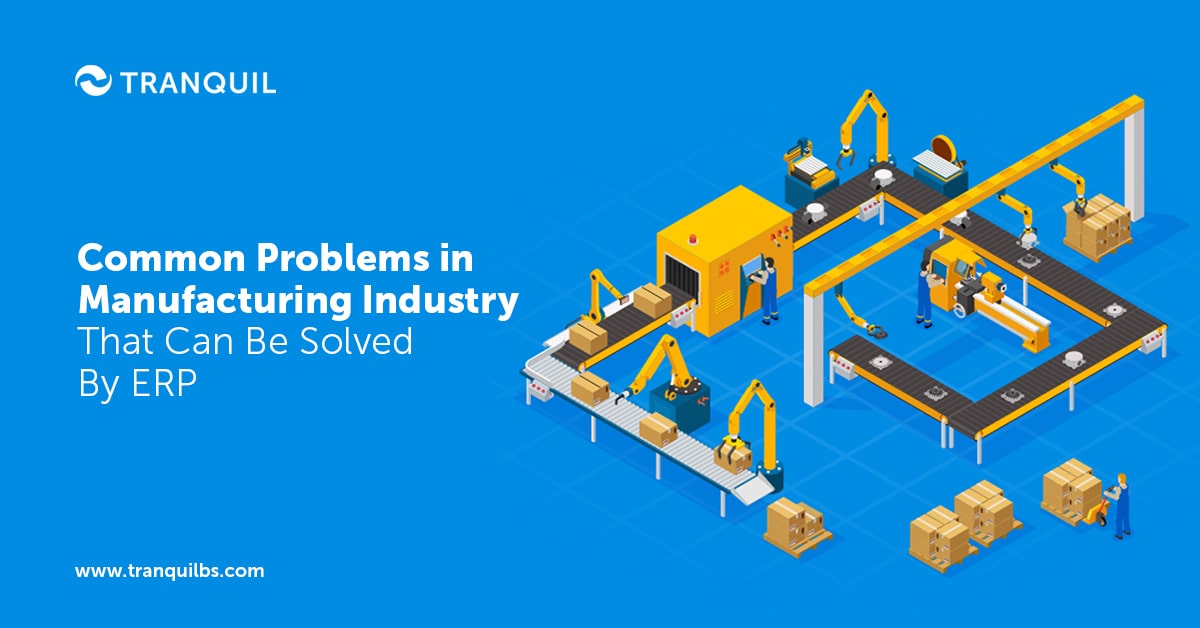solutions like Tranquil help solves common problems faced by manufacturers and help them leverage emerging opportunities by providing in-depth insights into the business processes.
If you operate a manufacturing business and are not using an ERP system, you are likely to face a wide range of manufacturing issues every single day.
So what are these problems, and how exactly does ERP help to solve them?
Common Problems in Manufacturing Industry
1. Data Collection Errors
The speed at which you collect and analyze data can define the speed at which your business grows.
With manual methods, you will tie up resources and time; moreover, it is prone to inaccuracies, causing expensive delays for your business.
Solution
ERP records data automatically, giving your immediate access.
Even if your production unit necessitates multiple applications to manage it, and you have numerous departments, all of the information is presented to you in a single centralized location.
ERP gets rid of siloed and fragmented data and presents a holistic view of your production processes, inventory levels, finance, sales forecast, assets, and more.
It empowers you with essential information that you need to improve the overall efficiency of your business.
2. Incorrect Reporting
Lack of real-time information means you don’t know the exact inventory or finance situation at any given time.
Outmoded data handling methods can lead to delayed reports and unanswered queries, leading to more hurdles that impact the business negatively.
Solution
ERP improves data visibility with its accurate reporting features, enabling manufacturers to pre-set projections that will allow them accurate raw material procurement to eliminate problems like under or over-production, reduce the inventory turnaround time, etc.
When used correctly, this information can help businesses take precise, data-driven decisions, and help boost revenues and profits.
ALSO READ: Tips to Improve Inventory Turnover
3. Integration of Operations and Locations
Many manufacturing companies have units that are spread across multiple locations, and use disparate systems, leading to data silos, poor flow of information, and lack of coordination among locations and even departments.
It is difficult to implement standard processes throughout the company.
Solution
ERP software solves one of the biggest manufacturing problems through the integration of various processes, like planning, procurement, inventory, production, HR, marketing, sales, finance, supply chain, and assets.
It also collects data from all departments, locations, and business verticals, allowing full visibility into every process, and a bird’s eye view of the whole business.
Thanks to ERP software, companies are able to implement policies throughout the company, define rules and guidelines for various activities, as well as standardize workflows.
ALSO READ: Challenges in ERP Implementation
4. Proper Inventory Control
To keep production going, manufacturing companies need to ensure optimal inventory levels.
This becomes difficult without complete visibility into inventory.
A manufacturing company may have inventory at various locations – in warehouses, production lines, and in transit.
This can easily lead to situations like stockouts or overstocking, impacting production and costs.
Solution
We’ve seen how it becomes easy to define and deploy standardized processes and practices across the organization; the same goes for inventory control.
Things like reorder levels and quantities, safety stocks, and lead times can be defined, and alerts can be set for approval notifications to purchase inventory.
ERP software also generates a wide range of inventory management reports that help you to understand trends and take remedial action to help you maintain optimal inventory levels, reduce costs, and boost profitability.
5. Optimum Resource Utilization
One of the biggest problems in manufacturing industry is optimal resource utilization for reducing production costs.
Without an integrated system, there is no way for you to know how well you are utilizing your resources.
Manual paper entries are prone to duplication or loss of information.
Solution
ERP systems record important information about your company’s equipment, plant, machinery, etc.
It sends notifications for routine servicing, maintenance work, inspection, and so on, based on pre-specified conditions or time periods.
This helps to make sure that all your equipment and machinery, and in fact the entire plant, are in good operating condition for maximum productivity and longer running life.
With various reports like Capacity Utilization, Machine Downtime, and Equipment Efficiency, you can get insights about whether the utilization is proper or not, and take the necessary steps to ensure efficiency.
ALSO READ: How ERP Software is Playing Role to Improve Business Productivity?
6. Low Employee Productivity
When employees are inefficient and/or unproductive, it can have a negative effect on the functioning of the whole organization.
Employees may spend inordinate periods of time in executing repetitive and routine activities, paperwork, data entry, complying with regulations, report generation, bank reconciliations, following up for authorizations and approvals, and the like, rather than focusing on tasks that add value to the business.
Solution
Through digitization and automation, paperwork and manual effort is reduced significantly.
Approvals are sent through email, reducing the overall time required for the process.
It also sends alerts and notifications to enhance coordination and communication.
Thanks to the quick and easy reporting features of Tranquil ERP, employees can save a great deal of time, which they can redirect towards building better relationships with vendors and customers, looking for less expensive alternatives, and the like.
ALSO READ: Ways to Improve ERP with AI
7. Reducing Costs
Every business has the ultimate aim of earning profits; in a manufacturing business, the most efficient way of earning and increasing profits is by reducing production costs.
Cost control is one of the most significant problems facing manufacturing industries.
Without a proper system, it is almost impossible to know exactly how much cost you incurred on raw materials, procurements, maintaining inventory, labor, overheads, and so on.
It will also not be possible to observe trends and view problem areas where you can reduce the cost.
Solution
With a robust ERP solution like Tranquil, you can set standardized processes for all activities like inventory management, procurement, supply chain, etc.
This can help you lower the cost of operation, leading to higher profits eventually.
With detailed, real-time reports on the different costs incurred by your business, you can generate various reports like Department Expenses, Overhead Costs, Production Cost, Work in Progress, Materials Cost, and so on.
These reports help you keep a lid on your expenses as well as to analyze the expense pattern.
Managers can check if the expenses are as per the estimates or if they overshoot the estimates, allowing them to take remedial action.
ALSO READ: Key Benefits of ERP for Accounting and Financial Management
8. Supply Chain and Timely Delivery
Delays in the supply chain affect the entire business – pausing of production, delayed shipments, increase in production cost, and shortage of products for delivery, are just some of the problems that can happen.
Supply chain can be affected by several factors that are often not in your control, but there are still ways to get around them.
Solution
With the right ERP solution, you can ensure that the correct product gets delivered to the correct place, in the correct quality and quantity, and at the correct price.
ERP helps businesses to set practices and standards for materials requirements, supply contracts for the long-term, price negotiation, optimal inventory level maintenance, configure rules and workflows to manage warehouses, arrange inventory if speeding up production is required, and ensure quality with frequent inspections and testing.
These methods help to make sure that you have a robust supply chain and deliver products to your customers in a timely fashion.
ALSO READ: Important ERP Modules and Functions
9. Low Production Quality
It is essential to manufacture quality products and to achieve this, every manufacturing company must follow some basic standards of quality.
It can be daunting and time-consuming to maintain the same standard of quality in every batch that is produced.
Solution
Tranquil ERP has inbuilt tools for quality control that can help you execute quality control measures, especially where your newly procured raw materials are concerned.
The system can effectively track and assess the materials, and monitor the quality of the product as it goes through the various processes of production, to ensure that the finished product is of good quality and fit to be delivered to the customer.
ALSO READ: How Does ERP Deliver ROI for Business?
10. Poor Planning and Scheduling
In manufacturing, every element of your facility must be planned well.
Only when you manage it properly, can production schedules and deliveries be properly aligned.
However, it is nearly impossible to do this without inventory and sales forecasting data.
Solution
ERP offers accurate data that helps you draw up schedules for activities on the shop floor, and allocate the correct resources like raw materials, employees, and equipment to each phase and activity, so that production can be started.
Most companies don’t have planned workflows; ERP eliminates this problem.
You can easily schedule all the batches appropriately, to meet market demands, and make sure your materials are properly utilized, for uninterrupted and sufficient production.
ALSO READ: Benefits of ERP in Purchase Department
11. Changing Consumer Demands
Not having information about dynamic market trends and consumer demands can be a big stumbling block for manufacturing companies.
You may have improper raw material procurement, leading to lengthy inventory turnaround, over-production or shortage, etc., which could result in huge losses in revenue.
Solution
With ERP systems, you can record and store vital information, and use it for the betterment of your company.
ERP allows you to study important customer data, giving you vital insights into their behavior.
It empowers businesses to plan production more efficiently.
The two-way communication feature allows your customers to check the status of their orders and also share reviews.
This can be very helpful in making some tweaks to the product as per customer’s needs, and offer them enhanced service.
ALSO READ: What is Negative Inventory and How Can you Prevent it?
Get the Best ERP for Your Manufacturing Business
Are you stuck in a time warp, with spreadsheets or obsolete and disparate systems for your manufacturing business?
Are you unable to trace ingredients and products? Are you spending a lot of time to verify reports from disparate systems?
If you have answered Yes to any of these questions, it’s time to switch over to Tranquil Cloud ERP for manufacturing. Tranquil is a cloud-based, secure, scalable, and flexible software solution that will help you save time, effort, and money, and accelerate your growth story. Do schedule a demo of our software to know more, and how it can improve your manufacturing business. We will be happy to walk you through the solution and answer any queries you have.





